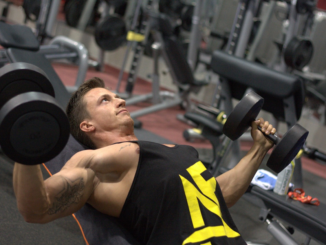
We’ve all experienced the discomfort of post-workout muscle inflammation. It can be anywhere from mildly uncomfortable to “walking downstairs is impossible” painful. While too much inflammation can lead to injury, it isn’t necessarily a bad thing. Without soreness, your muscles wouldn’t adapt and grow.
Every time we work out, we create microtears in our muscles. In an attempt to heal the tears, our bodies cause inflammation in our muscles. This swelling can be very beneficial to increasing our muscles and becoming stronger. The inflammation process removes damaged tissue, and cells work to repair the microtears, making your muscles stronger.
If, however, you continue to do strenuous exercises while your body is doing this work, it can cause scar tissue. Without proper rest cycles, the muscles aren’t able to repair themselves before you stress them again. This could lead to chronic inflammation issues and prolonged injury.
Many of us treat our muscle aches with anti-inflammatories such as ibuprofen, but this might not be the best thing to do. Our bodies go through these healing cycles for a reason, and if we use these medicines—if we block the inflammation—our body isn’t doing the work it needs to do to repair the muscle damage we have done.
While studies on the use of anti-inflammatories are somewhat inconclusive, I prefer to err on the side of caution and only use them when necessary. If I have muscle soreness, I avoid using any medicines, but if I am experiencing severe soreness after a race or relay, I will take some Aleve – usually only on the second day when the discomfort is at its worst. I prefer Aleve because it lasts longer than Advil, and I don’t have to take as many.
If you wish to reduce inflammation without medicines, you can attempt to do so through eating anti-inflammatory foods. Try consuming more berries, cruciferous veggies, and foods packed with healthy fats such as fish and avocados. There are also some spices that help with inflammation – you could try turmeric tea or supplements. Cinnamon is also used for its anti-inflammatory properties, and is, in my opinion, more palatable than turmeric.
When should you worry about inflammation? When soreness hampers your everyday movements, you should think about resting to let your muscle fibers heal and the tenderness to diminish. Overtraining and not taking breaks in exercise can lead to chronic inflammation and will lead to injuries and burnout.
Sources:
https://www.active.com/articles/is-inflammation-holding-you-back
https://www.ncbi.nlm.nih.gov/pubmed/23539314
https://www.ncbi.nlm.nih.gov/pubmed/8936509
https://www.healthline.com/nutrition/13-anti-inflammatory-foods




